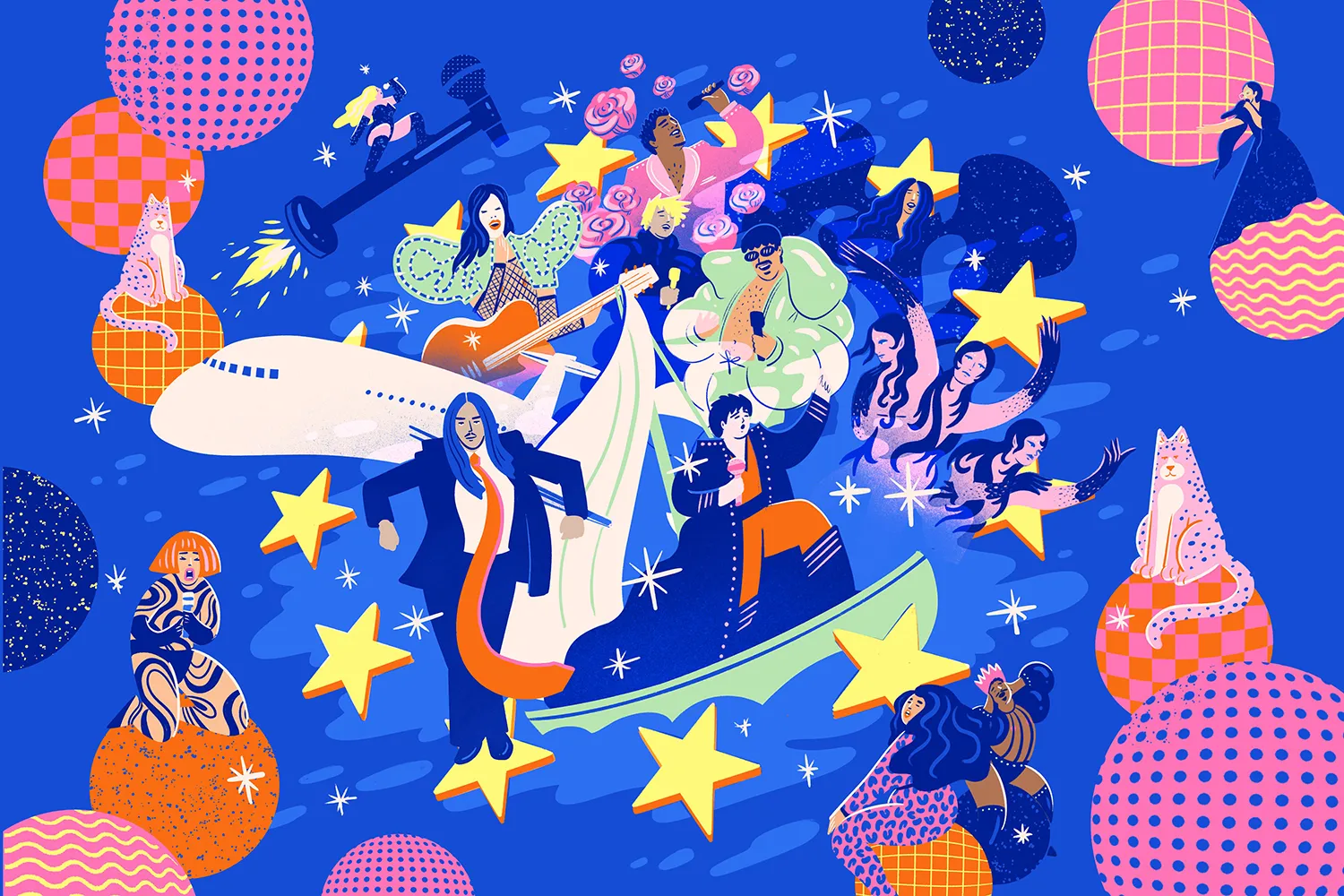The West Is Strong—and in Sequins

Tara Jacoby illustration for Foreign Policy
In the 1960s, just as the world’s most beloved song contest was entering its second decade, the European Broadcasting Union (EBU) wagered the unthinkable: Should Eurovision be discontinued? At the time, the project of European integration was still new, the memory of World War II still fresh; Europop was just beginning to flood the car radios of the first-ever generation of middle-class Europeans to discover that “holiday” could be a verb. The contest, meanwhile, was mired in criticism.
According to Dean Vuletic, a leading historian of Eurovision, three critiques from those early years persist to this day: It costs too much, the music is of mediocre quality, and the voting is “rigged.”
In the 1960s, just as the world’s most beloved song contest was entering its second decade, the European Broadcasting Union (EBU) wagered the unthinkable: Should Eurovision be discontinued? At the time, the project of European integration was still new, the memory of World War II still fresh; Europop was just beginning to flood the car radios of the first-ever generation of middle-class Europeans to discover that “holiday” could be a verb. The contest, meanwhile, was mired in criticism.
According to Dean Vuletic, a leading historian of Eurovision, three critiques from those early years persist to this day: It costs too much, the music is of mediocre quality, and the voting is “rigged.”
This year was an odd time, as an American, to be attending this distinctly European phenomenon. Arriving in Basel, Switzerland, last week for the 69th edition of what is now the world’s largest musical event, whose more than 160 million annual viewers make it one of the most popular broadcasts in all of global television, it occurred to me that these are the very same complaints currently levied against liberal democracy: strained budgets, declining quality of services, and contested elections. As the trans-Atlantic relationship sinks to its lowest point since the Iraq War, the Eurovision slogan, “United by Music,” also feels newly urgent for continental security. The Trump administration could not be clearer: America’s own commitment to liberal tolerance is over, and Europe is on its own.
You might say Eurovision is, in fact, a rare example of what that future might look like: a model of the West without America. For despite the influence of American music on artists and the general rise of global Anglophone hegemony, the contest remains, Vuletic said, “quintessentially European” and the very largest cultural event “bringing Europeans together.” Is its ethos—that is to say, spandex, sequins, and the inalienable right to let your freak flag fly—the force holding together the last bastion of the contemporary Western order?
Winding through a Basel streetscape crammed with flags, balloons, and karaoke stages, where fans of varying vocal ability resurrected previous years’ hits, I wondered: Is this annual celebration of diversity and self-expression not, in some way, what liberalism is?
#gallery-2 {
margin: auto;
}
#gallery-2 .gallery-item {
float: left;
margin-top: 10px;
text-align: center;
width: 100%;
}
#gallery-2 img {
border: 2px solid #cfcfcf;
}
#gallery-2 .gallery-caption {
margin-left: 0;
}
/* see gallery_shortcode() in wp-includes/media.php */
- Swedish pop group ABBA on stage after winning Eurovision in Brighton, England, on April 7, 1974. Frank Barratt/Keystone/Getty Images
- Celine Dion, representing Switzerland, dabs her eyes after winning Eurovision in Dublin on April 30, 1988. Independent News and Media/Getty Images
For the uninitiated—which is to say, for most Americans—there are many ways to describe Eurovision, but they all lead to the same conclusion: that the contest is characterized by paradox above all. Launched in Switzerland in 1956 to promote cooperation in postwar Europe, today Eurovision is the height of camp, bemoaned by music snobs and celebrated by members of the LGBTQ+ community, who have claimed it as the World Cup for queer people. It serves, simultaneously, as a show of transnational cooperation, a platform for nation-branding, and a “nonpolitical” arena for the celebration of liberal values such as tolerance, diversity, and individual expression—values that, as the recent rise of right-wing movements has shown, turn out be political after all.
It is an opportunity for countries from the former Soviet bloc or even from beyond the European continent—Australia, Azerbaijan, Georgia, and Israel are all veteran participants—to express their alignment with those values and the eurozone writ large. Or to reject them, as was the case when Turkey and Hungary withdrew their national delegations before the 2013 and 2020 contests, respectively, with the former citing sham voting and the latter implicitly rejecting the broadcast’s celebration of queer identity.
There are three rounds of live performances: two semifinals, followed by a final. Only 26 acts qualify for the finale bonanza, when the Eurovision victor is chosen live on prime-time television through a famously baroque rank-choice voting system that combines country-level public televotes with the results from each nation’s expert jury. (Americans can vote in the catchall category for nonparticipating countries, “Rest of the World.”) Juries and the public can award points to any nation except their own. The resulting voting patterns have spawned an entire academic subfield analyzing world-historical alliances and rivalries steeped in 20th-century history: This year, as every year, the people of Cyprus awarded the maximum 24 points (12 from the public, plus another 12 from the jury) to Greece. Translated into Yankee argot, you might say Eurovision is a cross between the Super Bowl halftime show and the Olympics, viewed through the haze of a strong 20th-century hangover.
The winning country hosts next year’s competition, unless they can’t afford to or are at war, as was the case for defending champion Ukraine in 2023, which passed the honors (and expenses) to Liverpool in the United Kingdom. In the end, even as Eurovision is officially a nonpolitical event, everyone knows it’s really geopolitics in drag.
The United States has never participated in Eurovision, not because it isn’t geographically located in Europe (otherwise countries such as Israel and Georgia wouldn’t be in the running) but because, unlike the 37 countries that took part this year, none of its public broadcasters are members of the EBU, the host organization for Eurovision. It’s the EBU that maintains rules and regulations regarding eligibility, as well as the contest’s nonpolitical nature.
That said, there is a certain protectiveness of Eurovision’s European quality vis-à-vis the United States. (As one fan visiting from Germany’s Bavaria region told me, “You guys can do your own thing—it’s all right.”) Saskia Jaszoltowski, a musicologist at the University of Graz in Austria, who has studied music in political contexts from the Third Reich to Eurovision, points out that the contest was founded not only with unity in mind but to support the European music industry amid rising U.S. cultural hegemony. That Eurovision is relatively unknown in the United States, however, hardly stopped enthusiastic fans from traveling across the Atlantic this year to support its unifying mission. For them, Eurovision has become custodian to all the values that the Trump administration has left behind.
“This is basically the opposite of the current government,” said one young American man, who arrived in Basel from London draped in stars and rainbow stripes. A trio of men from Chicago, who introduced themselves as “the ‘G’ in LGBTQ+” and who were supporting Israel and Finland, told me that with the shift to the right in the United States and elsewhere, Eurovision’s message of “bringing people together feels especially important.” (The famed ridiculousness, glitz, and everything else they “love to hate” is, to boot, an escape from “all the bullshit.”) Another man expressed surprise at the lack of anti-American sentiment he experienced, given the Trump administration’s recent harassment of European counterparts over tariffs and Russia’s war in Ukraine. The Swiss American standing in front of him warned against a Europhilic romanticism. “There’s a right-wing movement in Europe, too, not only in the U.S.,” she said. Still, America feels like a model of what might happen but hasn’t yet: “Europeans are very watchful and concerned about what’s happening across the Atlantic.”
Three 30-something women in matching, homemade silver hats, out of earshot of this call to caution, told me, wistfully, “I wish we did have something like this in the States.”
Fans cheer before the start of Eurovision in Basel, Switzerland, on May 15. Fabrice Coffrini/AFP via Getty Images
The good news for prospective fans is that regardless of where you reside, Eurovision is, first and foremost, a television production, meant to be watched from your living room. Most Europeans will have grown up tuning in with friends and family at watch parties, where it’s common to draw up bingo cards with classic Eurovision cliches and check off the boxes as the show evolves.
Did a Baltic state feature electrofolk heightened by outrageous costumes? Did the United Kingdom win nul points (French and English are the official languages of Eurovision, another postwar legacy) in the combined public vote? Did the French sing in French? (Did they submit, yet again, a defiantly somber ballad in an act of snobbish, yet heroic, defense of good taste?) Did Italy give a boy-band nod to glam rock? Bingo.
This year’s winning card would have also included combat gear from a futuristic space age, boats, flame blasters, and—a major break from recent precedent—lyrics sung in native languages. Eurovision powerhouse Sweden, which introduced the world to ABBA with the pop group’s winning entry, “Waterloo,” in 1974, performed its first non-English song since 1998. Nearly two-thirds of this year’s songs, in fact, were sung in languages other than English, including—in addition to a strong showing in French—Finnish, German, Greek, Icelandic, Italian, Latvian, Lithuanian, Polish, and Portuguese. It’s a strong signal that audiences and artists, if not Europe as a whole, are willing to tilt away from Anglocentrism—and the commercial opportunities that have historically come with it. As a German attendee told me, “They always get an extra point from me if they sing in their native language.”
The final lineup, pruned to 26 acts in the semifinals, also contained two boats, three sequined bustiers, and four mid-song costume changes. (Australian artist Go-Jo, knocked out in the semifinals, would have been the fifth artist to strip on stage, shedding his shirt after emerging from an oversized blender filled with liquid smoke during his performance of “Milkshake Man.”) Latvia brought the obligatory witchy number in six-part harmony, with the entire band dressed as forest nymphs in bronze lamé and fairy crowns; the crowd went wild when, mid-act, they appeared to grow tails, an illusion conjured from the LED backdrop at Basel’s St. Jakobshalle arena. There were two aerial lifts, one in Poland’s “Gaja,” in which 52-year-old popstar Justyna Steczkowska, clad in a slashed leather-like unitard, was raised over the stage by two black ropes reminiscent of BDSM. The second arrived in the cult-favorite “Ich Komme” (“I’m Coming”) from Finland, which ended with sex-positive singer Erika Vikman belting the orgasmic chorus in Finnish and German while soaring on a giant golden microphone stand that, in the final moments, ejaculated—innuendo intended—golden sparks.
Finnish singer Erika Vikman performs “Ich Komme” at Eurovision in Basel on May 15. Fabrice Coffrini/AFP via Getty Images
The EBU code of conduct explicitly prohibits performers from engaging in “political promotion or related conduct, including actions, statements, or symbols during—or in relation to—the event.” Last year, Israeli contestant Eden Golan was forced to revise her original entry, “October Rain,” for its apparent reference to Hamas’s Oct. 7, 2023, attack on Israel; the final rendition was titled “Hurricane.” Overt sexual obscenities are also a no-go. This year, Maltese singer Miriana Conte had to revise her punny lyrics just before the submission deadline once the EBU, acting on a complaint filed by the BBC, caught the phonetic resonance between “kant,” the Maltese word for “singing,” and a certain English slur.
Eurovision’s slapstick, self-referential, and sexually provocative aesthetic emerges, in part, from these restrictions. But politics is never entirely eliminated either. A hint of politically charged comic subversion made it onto the final stage via “Espresso Macchiato” by Estonian rapper Tommy Cash, who got his start back home under the moniker “Kanye East” and who has since collaborated with American superstar Charli XCX. An ironic ode to cafe culture sung in an exaggerated Italian accent (“No stresso, no stresso / No need to be depresso”) and laced with questionable Italian stereotypes (“I’m sweating like a mafioso”), the song is a rare example of one country parodying not its own national stereotypes but another’s.
Tommy Cash, representing Estonia, performs on stage during Eurovision in Basel on May 17. Harold Cunningham/Getty Images
Americans will have also noticed that Cash performed in a navy suit, white shirt, and overly long red tie whose extra footage recalls the trademark neckwear of the current U.S. president, especially when combined with the act’s megalomaniacal backdrops, including a bouncing private plane that flapped its wings along to the beat. (Every surface in the arena was an LED screen ready to burst into each act’s tailored backdrops and animations.) The choreography, furthermore, included a wild shuffle that commentators speculated was an exaggeration of Trump’s signature dance move, the side-to-side alternating fist pump. A clear crowd darling, Estonia came second in the televote, just 39 points behind the public favorite Israel, and third in the contest overall. In the combined vote, Israel was this year’s runner-up with “New Day Will Rise,” sung by Yuval Raphael, a survivor of the Nova music festival massacre on Oct. 7.
A selection of the varied mix of performers at the 2025 Eurovision contest in Basel.Getty Images
The overwhelming theme of this year’s entries was resilience and self-confidence. Part of this is simply the nature of pop, Eurovision’s dominant genre, whose associated themes, Vuletic said, have thus been well represented for years. Resilience was also an unobjectionable choice for a public exhausted by a relentless post-pandemic news cycle, including the controversy over Israel’s participation in Basel.
Yet multiplied through dozens of acts, something about the message began to ring false. “I’m a survivor / Stay aliver,” sang Armenia’s Parg while running on a treadmill, stripped to his waist and slathered in mud, seemingly impeded by nothing other than his own heavy cargo pants and combat boots. “Nothing can bring me down,” belted Norway’s Kyle Alessandro, who kicked off the final with this year’s representative aesthetic of dystopian adventure, as if artists were addressing us from the near future on a planet colonized by Elon Musk and landscaped by artificial intelligence trained on Avatar and Dune. (On this planet, everyone wears formfitting bodysuits, plus or minus, in Alessandro’s case, a Viking-style breastplate.)
The Icelandic Gen-Z duo VAEB shoehorned similar tidings into an Icelandic rap about rowing that somehow managed to combine hoedown instrumentals with the energy of techno. Translated from the Icelandic: “There is nothing that can stop me now”; “If I sink today / It’s no problem.” “Cannot, cannot, cannot, cannot / Cannot ruin me,” echoed Latvia’s ethereal wood nymphs in their Enya-esque harmonies—and in Latvian—while Luxembourg, Malta (“Why should we let other people decide / When we could be having the time of our lives?”), Poland, and Spain gave odes to girl power, celebrating a doll liberated from her marionette strings, “queen energy,” the earth goddess Gaia, and divas, respectively.
Produced in slick pop beats, the music, meanwhile, struck a different mood: party, party, party. From within the arena, at least, it was difficult to detect any sense of the struggle that was so necessary to overcome. A rare exception was Ukraine, which seems to have used the Eurovision license to sing in less-than-fluent English to sneak a possible protest into “Bird of Pray,” which combines Ukrainian and English lyrics. The official chorus reads: “Bird / I’m begging you / Begging you please just / Live.” Sung in pop-rock harmony reminiscent of ABBA, it is indistinguishable from “I’m begging you, begging you, please just leave,” addressed to that more idiomatic of avian species, the bird of prey.
A fan waves an Israeli flag as Yuval Raphael performs at Eurovision in Basel on May 15. Fabrice Coffrini/AFP via Getty Images
“Politics has always been involved in the contest,” said Vuletic, whose research into Eurovision’s history has focused on just how political a nonpolitical event can be. In the very first competition in 1956, West Germany sent Walter Andreas Schwarz, whose biography as a Holocaust survivor, combined with a song about longing for a better future, sent a strong message about postwar priorities. In 1968, Czech singer Karel Gott won Intervision, a rival song contest hosted in the Soviet bloc during the Cold War, with his song “Tausend Fenster” (“Thousand Windows”), with its allusions to the Iron Curtain. That year, he represented Austria at Eurovision with the same number, during the height of the Prague Spring. Turkey boycotted Eurovision in 1976 in protest of the Greek entry, “Panaghia Mou, Panaghia Mou” (“My Lady, My Lady”), which censured the Turkish invasion of Cyprus. And in 2009, Georgia withdrew after refusing to revise the lyrics to its song “We Don’t Wanna Put In,” a protest song written in response to Russia’s attacks during the Russo-Georgian War the year before. Russia participated in Eurovision from 1994 to 2021 but was expelled by the EBU shortly after invading Ukraine in 2022.
In the wake of that unprecedented expulsion, Israel’s participation in 2024 during the ongoing Israel-Hamas war strained the spirit of “United by Music” nearly to the breaking point. In that year’s host city of Malmo, Sweden, thousands of people took to the streets calling for an end to Israel’s ongoing bombardment and blockade of Gaza—since characterized as genocidal by human rights organizations around the world. Irish contestant Bambie Thug was censored for attempting to perform with the words “Cease-Fire” and “Freedom for Palestine” scrawled in medieval Irish script on their face and legs. Slimane, representing France, paused his dress rehearsal performance to deliver a desperate message of peace and love. Despite the sense that the contest had turned hostile toward Israel, however, the country came second in the public televote.
The mood in Basel this year was calmer, leavened by Swiss neutrality and new rules surrounding contestant speech that Vuletic said were intended to “clamp down even more on the politics” following last year’s scandals. Arriving at St. Jakobshalle to attend the second semifinal, five employees from Basel’s pharma industry, who collectively hailed from Argentina, Ireland, and Uzbekistan, told me that Eurovision was a “light-hearted balance to all the shit that’s going on in the world.” A native of Munich in a tailored, purple-sequined jacket was attending Eurovision for the 12th time because its message had only become more important in recent years. “I really believe very much in the European idea,” he said. When I asked if he was voting for Latvia due to any connection to the country, he responded that this was precisely the beauty of what the contest, at its best, could be: You don’t need a personal connection in order to show enthusiasm for another country’s music, language, or culture.
But dip below the surface, and the quietude quickly transforms to a kind of denialism. The fans I spoke with were uneasy, voicing concerns about the fragility of the project of pan-European integration that Eurovision is meant to support. Two days later, at the final, a France-based Israeli couple, draped in Israeli flags and crowned with headgear of white-and-blue pompoms erected on antennae, recalled the euphoria of Israel hosting the contest in Tel Aviv in 2019, telling me that Eurovision used to feel like a “100 percent party” with “great vibes.” This year, however, was “different.” “We’re happy to be a part of it and to have the opportunity to show our voice,” one said, elaborating on how important it was for Israel to be part of this community. “But it feels a little like we’re the unwanted child.”
The EBU’s posthaste expulsion of Russian broadcasters has become an important object lesson in how, in today’s polarized times, liberal institutions ought to regulate and define terms of inclusion. In an initial statement, published on Feb. 25, 2022—one day after the invasion of Ukraine began—the EBU said “the inclusion of a Russian entry … would bring the competition into disrepute.” In a later statement, published four days later, the union offered different reasoning, explaining that Russia’s broadcasters RTR, Channel One, and RDO were excluded for failing to meet standards of media independence required by union membership. Going into this year’s contest, broadcasters from Iceland, Ireland, Slovenia, and Spain cited the Russian case in calling on the EBU to bar Israel from participating in Basel. More than 70 former participants signed a letter expressing a similar message.
Fans, some draped with Ukrainian flags, gather at Place de la Bastille to watch Eurovision in Paris on May 17. Kiran Ridley/AFP via Getty Images
It’s that first statement’s ambiguous reference to “disrepute” that has especially jeopardized the EBU’s claim to neutrality, exposing it to accusations of hypocrisy. Jaszoltowski, the musicologist, called it “rushed.” It was also confusing: The rules for the 2025 contest hold broadcasters responsible for taking “all necessary measures” to prevent Eurovision from being “politicized,” “instrumentalized,” “and/or otherwise brought into disrepute in any way,” while eligibility requirements simply state that a song be under three minutes, invite no more than six performers (and no animals) on stage, and be submitted by a member of the EBU. A country’s broader reputation, however, is nowhere mentioned.
“You can only be part of the European Broadcasting Union,” Jaszoltowski pointed out, if you comply with “freedom of speech, freedom of press, I mean all these values that are in danger in the last couple of years”—terms that require broadcasters, if not their governments, to adhere to a kind of liberal tradition. Yet watchdogs, notably, had tracked threats to Russia’s freedom of press long before 2022: From 2014 to 2022, on Reporters Without Borders’ World Press Freedom Index, Russia ranked between 148 and 155 out of a total of 180 countries. Today, it has sunk to 171.
Which, then, is the defining criterion—disrepute or freedom of press? In response to a request for comment about its decision regarding the Israeli delegation, the EBU suggested the latter, stating that it is currently “supporting our Israeli member Kan against the threat from being privatized or shut down by the Israeli government,” a reference to a recent motion from far-right parties in the Knesset to bring the public broadcaster under private ownership.
Historically, Eurovision has served the important role of integrating, Jaszoltowski said, “even maybe those who have a hard time being integrated.” From 1961 to 1975, Spain competed under Francisco Franco’s fascist dictatorship, even hosting the contest in 1969, amid protest from other countries. It was an uneasy extension of tolerance practiced by other so-called nonpolitical international events. The Olympics, often held up as an imperfect analogy to the song contest, famously took place in Nazi Germany in 1936, where American sprinter and long jumper Jesse Owens won four gold medals in a legendary refute to the Nazi ideology of Aryan racial supremacy. The 1934 FIFA World Cup took place in Fascist Italy. And as William Lee Adams, who has covered Eurovision for the fansite Wiwibloggs for more than a decade, points out, Russia participated in 2014 after annexing Crimea and, a short time later, passing its anti-LGBTQ+ laws. That same year, Austrian drag queen Conchita Wurst, now a Eurovision legend, won it all: “Eurovision was the response to anti-liberal ideas,” Adams said.
It is precisely because Eurovision is a nonpolitical event that makes it such a rich site for protest and debate—and why unclear decision-making causes such a crisis of legitimacy for liberal institutions that claim to be nonideological. For many sympathetic to the Palestinian cause, the swift response to Russia remains yet another unforgivable case of applying double standards. “My politics don’t align with [Eurovision] at the moment,” said one disappointed fan, a British diversity officer based in Switzerland, attending the second semifinal. She hoped that in the future, the EBU would “walk the talk.” For now, “there’s a lot of hypocrisy.”
A protester holds a sign during a demonstration in support of Palestinians prior to the Eurovision final in Basel on May 17. Sebastien Bozon/AFP via Getty Images
For any participating country with an existential reason to gain the ear of the West—in particular, the West without America—Eurovision remains an incredibly powerful platform. In recent years, this has been especially true for Israel and Ukraine. While politicians are barred from the contest (Ukrainian President Volodymyr Zelensky’s request to address the crowd at the 2023 rendition was denied), broadcasters can still make profound political statements through their choice of contestants. “Of course it is a political statement of the national broadcaster of Israel to send this particular participant who survived the Hamas terror attacks,” said Jaszoltowski, despite the fact that “the song and her lyrics are not political at all.”
It was, by all measures, a successful message. In spite of the French Israeli couple’s sense that Israel was “unwanted” at the contest, Raphael’s “New Day Will Rise” won second place, notably sweeping the public vote. Even Spain, whose participating broadcaster called for Israel’s exclusion, allotted 12 points—the maximum allowed—to Israel in the public vote. So did the rest of Eurovision’s most populous participating countries, including Australia, Belgium, France, Germany, the Netherlands, Portugal, Sweden, the United Kingdom, and the catchall category, “Rest of the World.” (The reason Israel did not win the contest is that in the jury vote, decided by music industry experts, it came 14th, with 60 points to Austria’s winning 258. Votes are also not weighted by population; 12 points from Luxembourg, which Israel also earned, count the same as 12 points from Spain.)
Two disturbances took place during Raphael’s acts, one during a semifinal dress rehearsal and another during the final; in both cases, protesters were swiftly handed over to the police or security personnel. It is awful to contemplate the trauma that the survivor of a terrorist attack might have experienced during these disruptions. Multiple pro-Palestinian demonstrations took place in central Basel, at least one drawing hundreds of people, who called for Israel’s expulsion from the contest and a cease-fire in Gaza. On the other hand, the only demonstration to make it within visible range of the arena was a group of 20 or so local Christians waving Israeli flags just beyond the police boundary, who told me that they had gathered to support Israel’s right to defend itself and to protest antisemitism and the lack of neutrality toward Israel in the popular press. When I asked the group’s spokesperson for his views on the plight of residents of Gaza enduring the latest expansion of Israel’s military campaign—which has only added to the Palestinian death toll of more than 53,000—he said it was a “big problem.”
“But this is politics,” he added. In other words, beyond the scope of Eurovision.
There were no Palestinian fans to interview in Basel, of course, because Palestine’s bid to enter Eurovision was rejected in 2007 on the basis that its broadcaster did not meet standards for full EBU membership. Gaza does not currently have stable access to telecommunications services, let alone a functioning health care system. The vast majority of Palestinians in Gaza, furthermore, are currently prohibited from leaving the territory except under highly restricted circumstances—which do not include being the wild, campy, musical savants whom Eurovision attracts. One can only imagine what message a hypothetical Palestinian delegation would have chosen to send through its own contestant or song selection or how the public might have responded. Expelling Israel from the contest is unlikely to have improved the audience’s capacity to conjure such a counterfactual, just as the EBU’s expulsion of Russia failed to end the war in Ukraine. It was the absence of Palestinian voices, rather than Israel’s presence, that haunted St. Jakobshalle: On the night of the final, in a football stadium with ticketed spillover seating for 36,000, I spotted three wan Palestinian flags.
JJ, representing Austria, celebrates after winning Eurovision in Basel on May 17. Harold Cunningham/Getty Images
The voting patterns at this year’s Eurovision painted a portrait of a Western world—or at least of its European remainder—that is having trouble making up its mind. The winner, Austria’s virtuosic JJ, a classically trained countertenor with the Vienna State Opera, won with 436 points, the lowest winning total since the latest version of the rank-choice voting system was introduced in 2016. (Switzerland won last year’s contest with a whopping 591 points, while in 2022 Ukraine totaled 631.) The lower the number of points it takes to secure victory, the more national juries and viewers have scattered their loyalties across countries.
Austria’s win was a surprise to anyone who followed the bookies, who had KAJ, the Finnish comedy group representing Sweden with a spoof on sauna culture, in the lead for weeks. JJ’s triumph was not a surprise, however, for anyone who listened closely to the 26 finalists as a sample of an uneasy, confused liberal zeitgeist. KAJ’s comedic, self-congratulatory call to crank up the heat (translated from the Swedish: “Steam it up and let go of all stress today” / “Sauna brothers, we’re the ones who glow”) might have been received as a welcome call to escape. But for the juries, amid all that’s happening in the world, it read, perhaps, as another expression of exhaustion.
No wonder Estonia’s entry was such a crowd-pleaser, snatching the second-place finish in the televote: The enigmatic combo of Cash’s Trumpian suit with lines such as “Life is like spaghetti / It’s hard until you make it” is exactly the kind of uninterpretable, politically adjacent irony that resonates in a nihilistic moment. There is the sense that someone, somewhere, ought to be offended by such a song—but you, dear listener, are in on the joke.
JJ, by contrast, who won over the national juries and placed fourth in the public vote, performed in black and white on a sailboat lost in the middle of a simulated ocean, as if Tom Hanks had trained at a Viennese conservatory before starring in Cast Away. For “Wasted Love” tells a story of heartbreak and despair: “You left me in the deep end / I’m drowning in my feelings.” The sense that the world is, in fact, full of pain that is overcome only through struggle, discomfort, and great investment of time was heightened by the actually operatic vocals.
Halfway through the song, a whirlpool appeared on the stage floor as JJ began to struggle forward, steering the flimsy dinghy against an imaginary tempest. The choreographed struggle to stay upright against an invisible wind as a dark club beat dropped and strobe lights spliced the broadcast into a series of freeze-frames was pure Eurovision: exaggerated, melodramatic, decidedly overdone. But uniquely among the acts, it might have also hit a note of truth.
This post appeared in the FP Weekend newsletter, a weekly showcase of book reviews, deep dives, and features. Sign up here.
Jessi Jezewska Stevens is a novelist and journalist based in Geneva, where she covers European culture and the climate movement. Her most recent book is Ghost Pains, a story collection exploring the legacies of the 20th century. X: @JezewskaJ
Stories Readers Liked
In Case You Missed It
A selection of paywall-free articles

Four Explanatory Models for Trump’s Chaos
It’s clear that the second Trump administration is aiming for change—not inertia—in U.S. foreign policy.































Join the Conversation
Commenting is a benefit of a Foreign Policy subscription.
Subscribe
Subscribe
Already a subscriber?
.
View Comments
Join the Conversation
Join the conversation on this and other recent Foreign Policy articles when you subscribe now.
Subscribe
Subscribe
Not your account?
View Comments
Join the Conversation
Please follow our comment guidelines, stay on topic, and be civil, courteous, and respectful of others’ beliefs.
View Comments
Change your username |
Log out
Change your username:
CANCEL
Confirm your username to get started.
The default username below has been generated using the first name and last initial on your FP subscriber account. Usernames may be updated at any time and must not contain inappropriate or offensive language.